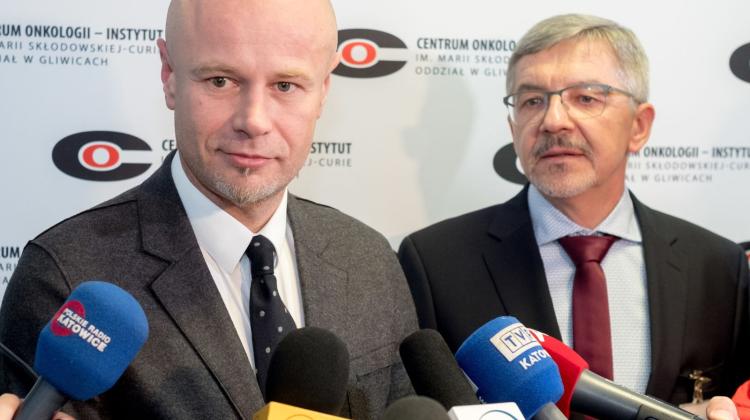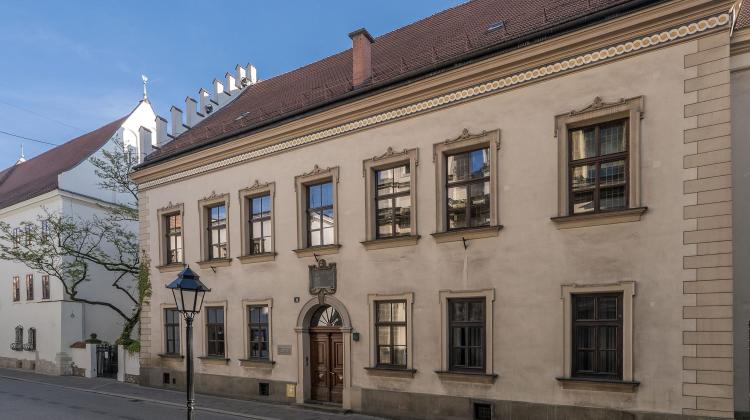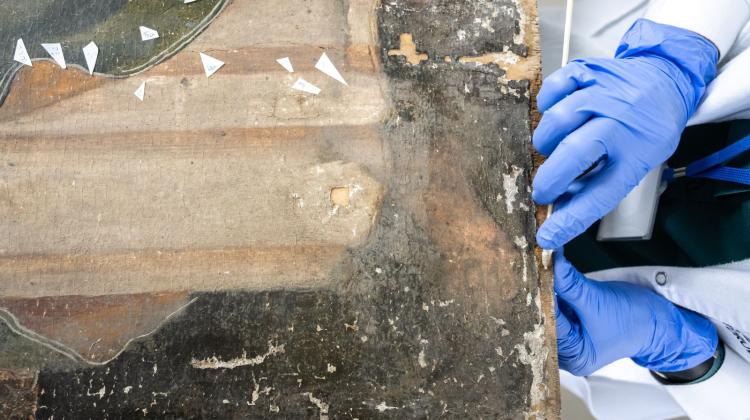Neck organ transplant performed in Gliwice
 Reconstructive surgeon, Prof. Adam Maciejewski (L) and Dr. Adam Dobrut (P) at a press conference on the allotransplantation, including the gastrointestinal tract, respiratory tract and skin, at the Cancer Center in Gliwice on 31 October. The conference was attended by the patient and Prof. Maciejewski's team. PAP/Andrzej Grygiel 31.10.2017
Reconstructive surgeon, Prof. Adam Maciejewski (L) and Dr. Adam Dobrut (P) at a press conference on the allotransplantation, including the gastrointestinal tract, respiratory tract and skin, at the Cancer Center in Gliwice on 31 October. The conference was attended by the patient and Prof. Maciejewski's team. PAP/Andrzej Grygiel 31.10.2017
Extended three-dimensional neck organ transplant was performed in a 63-year-old patient at the Cancer Center in Gliwice. Transplant restores the patient\'s normal breathing, eating and speaking.
In 2008, the patient received a liver transplant because of post-inflammatory cirrhosis and started to take anti-rejection drugs. In 2011, due to larynx cancer, the larynx had to be removed, and extensive skin and pharyngocutaneous fistula developed. Three repair surgeries performed in 2012-2013 did not produce the expected results. The patient breathed through the tracheostomy tube, because of the fistula he could not normally eat or speak.
On October 13, during the 11-hour surgery, Gliwice doctors transplanted the larynx, throat, oesophagus, parathyroid gland, hyoid bone, neck muscles and skin.
"The non-medical indications for this procedure were the determination of the patient who wanted this surgery and could not imagine not having it. Because of the permanent tracheostomy, there was no possibility of normal breathing, no ability to communicate, pharyngocutaneous fistula prevented proper nutrition" - head of the reconstruction team Prof. Adam Maciejewski said at the press conference in Gliwice.
Another argument for the transplant was that the patient was already taking anti-rejection drugs. "Previous immunosuppression allows to develop a certain tolerance of mechanisms in which subsequent another transplantation is much safer than the primary transplantation" - explained Prof. Maciejewski.
Krzysztof was present at the conference, but had to leave quickly due to planned rehabilitation. He told reporters that he was very pleased and thanked the doctors for the surgery.
The conference was also attended by the first patient, in whom Prof. Maciejewski and his team transplanted the neck organs in April 2015 - larynx, trachea, throat, oesophagus, thyroid and parathyroid gland, muscular structure and the skin of the front of the neck.
He said that he felt good, and when asked what he would tell Krzysztof, he said: "The worst is behind you. Now it will get a bit better every day".
"In each of these cases, the procedure is individual, in terms of both the extent of and the three dimensional, spatial structure of those elements that require reconstruction using a complex graft" - remarked Prof. Maciejewski.
Both procedures were pioneering on a global scale, among other things because of their extensiveness.
Gliwice reconstruction surgery team performs the most cancer-related reconstruction surgery procedures in the country. Every year it performs 250-300 extensive reconstructions, 70% of which covers the head and neck region, 20 percent - breast and 10% - limbs and other organs.
In recent years, doctors from the Cancer Center in Gliwice have become famous for several pioneering surgeries, including two face transplants. The first procedure was performed on May 15, 2013, in 33 years old patient Grzegorz, who survived a major accident. It was also the world\'s first life-saving face transplant.
The second operation was planned. In December 2013, doctors transplanted the face to 26-year-old Joanna, who had suffered from neurofibromatosis for more than 20 years - a benign genetic tumour that can endanger life when growing, and is considered one of the main indications for a face transplant. Last year, Gliwice physicians replanted scalps in two women who had suffered accidents while working in agriculture.
Author: Anna Gumułka (PAP)
PAP - Science in Poland
lun/ ekr/ kap/
tr. RL
Przed dodaniem komentarza prosimy o zapoznanie z Regulaminem forum serwisu Nauka w Polsce.

















